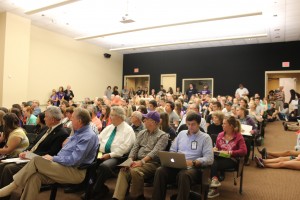The new North Carolina voting laws and what possible effects it might have on the election process were discussed during the panel organizer by the WCU Political Science Department (PSD) marking the celebration of the Constitution Day.
The room was packed with students and local people wanting to hear what will happen on the elections in 2016 when the law is implemented. Todd Collins, director of Public Policy Institute and associate professor in PSD, served as the moderator. Dr. Chris Cooper, Political Science Department Head at WCU, Zeb Smathers, from nonprofit Democrat North Carolina, and Kory Swanson, Executive Vice President of the John Locke Foundation in Raleigh, were the panelists.
Dr. Cooper gave an overview on some of the main changes that the new election laws bring to NC. He talked on the ID requirement; the elimination of preregistration for minors; the elimination of same day registration; the elimination of straight-ticket voting, and the paper ballot requirement.
According to Cooper, the political research shows that majority of people in U.S. do support Voter ID’s, this is more prevalent among republicans but Democrats as well. He said that in NC 66 % of the population support the idea of having voter ID. He also pointed out that North Carolina was one of only 10 states that did not already have this implemented.
Although there is not much evidence of fraud in any state, it seems both sides can agree that it is standard to have an ID. People of lower income and elderly would be most affected by this requirement, which could reduce their turnout at the polls up to 2.5%.
“Minorities are less likely than whites to have an ID, as well as to report lack of ID as a reason for not voting. At the same time they are more often asked to show it,” said Cooper.
Dr. Cooper closed by saying that what North Carolina is doing is not something that other states haven’t done before, but added that the rate of the change is very rapid. He also stated that he believed these changes will slightly decrease voter turnout.
Kory Swanson, vice president of the John Lock Foundation, made it clear that in his opinion, this bill was not created to be a voter suppression law. He pointed out that even with the new changes, NC still has some of the most liberal voting laws in the country.
Swanson gave his statistics that NC is joining the majority of other states with similar voting laws. NC is now the 46th state to disallow preregistration for teens and the 28th to require paper ballots. Only 14 other states do allow straight-ticket voting and Ohio is the only remaining state to allow same day registration during early voting.
“This bill brings us closer in line with the rest of the country,” Swanson said.
Zeb Smathers questioned why the new changes were necessary if the previous provisions were working fine. He stated that 56% of NC voters, Republican and Democrats, used the early voting which is now cut to 10 days from previous 17, although as Cooper and Swanson mentioned that the amount of hours is the same. Smathers was even more concerned with who exactly these changes would affect the most. He said that 34% of African Americans use same-day registration, which is cut with the new law and they use straight-ticket voting 50% more than whites. Now both of these options are excluded. Smathers believes that the new ID requirement is designed to make it harder for minorities, women, and students to vote (Student ID is not acceptable card).
“Why create more hoops to jump through? We should be expanding the process and making it easier,” Smathers said.
Although Smathers does not support the new election laws when it comes to the voting changes, he doesn’t believe these are the most important changes. He is most concerned with the way money effects elections.
“You cannot win in politics without money. If you don’t believe that, your political education is just beginning,” he told the audience.
The new laws allow more money to be donated to a candidate in the election campaigns, while less disclosure is required. This allows messages to be sent by each party without the politicians be required to back what they say (‘I approve this message’). Smathers believes this is such an important issue because it helps the people with money. The people with money will be elected, and then that affects everyone.
Smathers closed by asking these questions.
“Why do we have to do what everyone else is doing? What happened to wanting to be better?”
The discussion was ended with a question and comments from the audience.
Students seemed to benefit from the discussion, even if they were only there for extra credit.
“I thought it was a very worthwhile. There’s a lot of misinformation about the bill going around and this helped clear a lot of that up,” said Josh Pugh, a WCU junior.
You can find the new law here.



